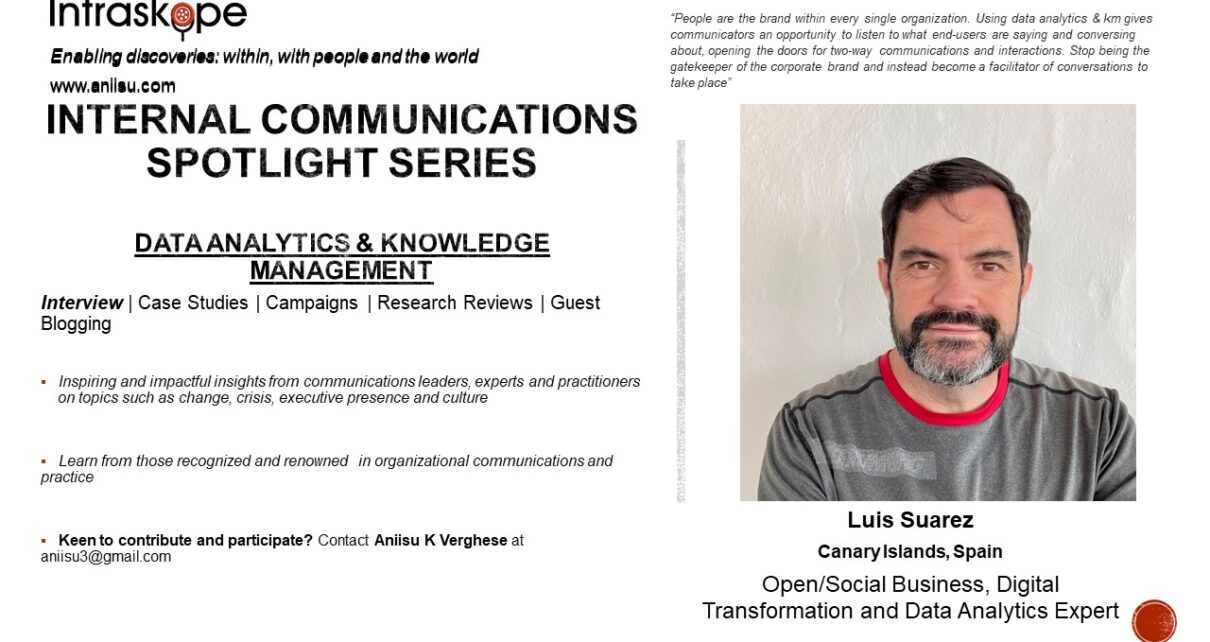While there is a deeper interest among communicators and organizations to tap the power of measurement and harness knowledge within the workplace, we often fall short in using these powerful tools. Leaders want to know how the organization is faring and communicators are interested to gauge the value of their work. However, vanity metrics and stop-gap measures don’t quite help. In this conversation with Luis Suarez, a thought leader in data analytics and KM, we learn how to bridge these gaps.
Gain insights from this interview where Luis shares how analytics and knowledge management can give communicators and organizations an edge in becoming more effective and appreciating how your employees think, feel and act.
Welcome to the 26th edition of Intraskope’s Spotlight Series featuring Luis Suarez, an open/social business developer, digital transformation and Data Analytics doer. Based in the Canary Islands, Spain, Luis has a wealth of experience working as a social and business strategist and a 2.0 practitioner for over 25 years, including many years at IBM. He deeply understands knowledge management, collaboration, learning, online communities, remote/distributed work and social networking for business. Luis helps organizations make the most out of their own change initiatives and digital transformation programs help them visualize data analytics in areas such as Unified Communications, Call Quality for MS Teams and Desktop Client Management.
In this interview, I spoke to Luis on the importance of data analytics and knowledge management and how leaders and communicators can make the most of these powerful tools.
Watch this interview with Luis to learn more.
In the Spotlight on Internal Communications Series, I talk to thought leaders on topics interrelated with internal communications such as culture, crisis, change, executive presence and leadership. The goal is to help unravel why they matter, what can leaders and communicators learn from experts and how we can put insights to practice.
Data analytics in IC and KM
- With communicators always short on time, how can data analytics and knowledge management become more mainstream in the function?
Communications has always been about speed, but eventually with both data analytics and KM it is not about speed, but effectiveness. Slow down because apart from focusing on traditional analytics for communicators that focus on vanity metrics, there needs to be an opportunity to focus on impact. It is important to master the art of persuasion and influence through data analytics.
2. What are the key benefits of using data analytics and knowledge management for communications?
Understanding the end-users needs & wants and figure out a way to meet them. People are the brand within every single organization. Using data analytics & KM gives communicators an opportunity to listen to what end-users are saying and conversing about, opening the doors for two-way communications and interactions. Stop being the gatekeeper of the corporate brand and instead become a facilitator of conversations to take place.
3. Could you share some examples of how these aspects have opened the eyes of leadership and communicators?
There is still plenty of room with regards to learners’ involvement in this space, but when having the opportunity they would benefit tremendously from having a human sensor of networks that leaders can tap into to learn more about the pulse of the organization. Be open on two-way conversations, so it’s not just about pushing communications out to employees, but also converse about them through the different topics. Understand we don’t know it all, and, as such, we should embrace our own vulnerabilities, so that we can work with them with our peers, networks and online communities to become stronger as a result.
4. How can communicators, especially those who are focused on internal communications be more adept at using these domains effectively?
By understanding that the key message is not necessarily master such specialties, but perhaps partner with those who know more. Build strong partnerships across the board to understand how to get the most and also how other business units operate under those domains. Again, through those domains focus on mastering the art of persuasion and influence on effect change, i.e. change of habits and behaviors, of business practices.
5. What advice and tips do you have for communicators to integrate these aspects into their everyday work?
Stop being the gatekeeper of the corporate brand, become fans or advocates of employees as the new corporate brand. Enable them accordingly. Help leaders understand and embrace the power of using social, digital tools to tap into the pulse of the organization, i.e. the employees and listen intently to what they are conversing about – Use all of these social, digital tools themselves to understand the new dynamics under this brave new normal of working distributed and away from the traditional office.
6. Any best practices you have observed and how is AI changing this piece of work?
A.I vs. Personal agency. Use with care. Understand the limitations of AI, but careful when it takes that agency away from employees through obscure algorithms. Adapt accordingly to the new times we’re living through. They require a different way of communicating, a different message for an entirely new audience: i.e. employees working from anywhere, no longer attached to a corporate structure, hierarchy, or an even a physical office. Do, not just try. It is the brave new-normal of how communications would be coming along in a world in which work is no longer about pushing content out, but about fostering and facilitating conversations.
Watch the complete video interview on YouTube or read the complete transcript above.
Missed the earlier episodes? Watch them here: D. Mark Schumann (Culture), Peter Yorke (Executive Presence), Sia Papageorgiou (Leadership Communications), Dianne Chase (Strategic Storytelling), Gloria Walker (Communication Planning), Rebecca Sangster-Kelly (Stakeholder Management), Ray Walsh (Localizing Employee Communications), Prof. Matt Tidwell (Reputation), Geri Rhoades (Manager Communications), Erik K Meyers (Business Acumen), Russell-Olivia Brooklands (IC Practice Governance), Paul Barton (Public Speaking and Business Communication), Cyrus Mavalwala (Digital Communication), Elvera N Makki (Social Impact Communication), Philippe Borremans (Communication Preparedness) and Magdalena Petryniak (Influence in Communications), Priya Bates (Communicating Diversity & Inclusion), Zora Artis (Communication Alignment), Diana Bonczar (Communication Execution), Jane McConnell (Gig Mindset), Paul Mathews (Trust & Communications), Brad Whitworth (Creativity in Communication), Zane Ewton (Podcasting), Andrea Greenhous (Employee Experience) and Jonas Bladt Hansen(Digital Technologies).
You can also look up the ongoing Intraskope’s Spotlight on Internal Communication Series featuring practitioners from around the globe sharing best practices and perspectives.
Liked the interview? Post your comments and share it with your network.
Keen to participate in the ongoing series on Personal Branding, Crisis Communications, Internal Communications or CSR Communications? Drop me a note at [email protected]
Here are Internal Communications resources you can use:
- Learn: Internal Communications Fundamentals Course on Thinkific
- Internal Communications Series: https://forms.gle/KcqmPzLwq7NQi5Km6
- Chat with Aniisu – Internal Communications: https://www.instamojo.com/intraskope/connect-with-aniisu-60-minute-personalized-d/?ref=store
- Internal Communications workshops: https://bit.ly/2zdBRl1
You can also visit my website www.intraskope.com and You Tube channel to know more about my work.
#IC #digital #internalcomms #digitech #anayltics #dataanalytics #analyticsincomms #KM #knowledgemanagement #KMforIC #socialmedia #opensocial #curiosity #experience #onlinecomms #leadercomms #connection #digitalmedia #Ipurpose #messaging #AI #algorithms #internalcomms #communications #internalcommunications #covid19 #LuisSuarez

